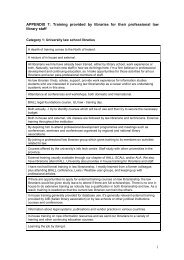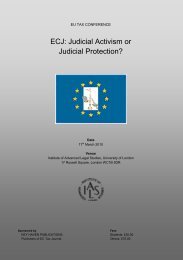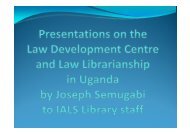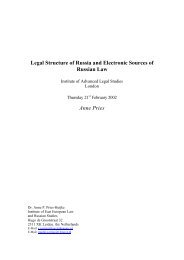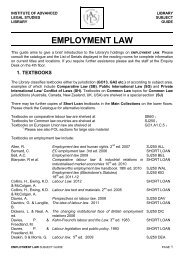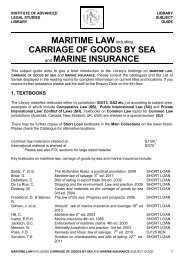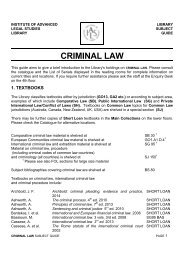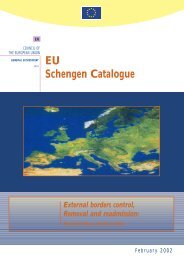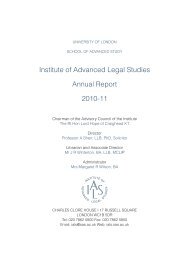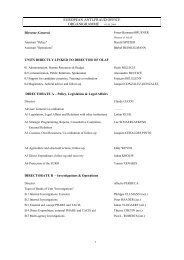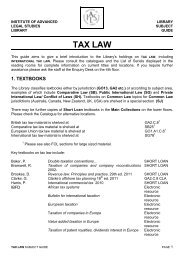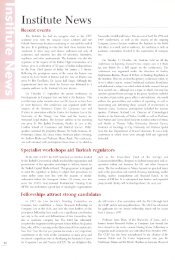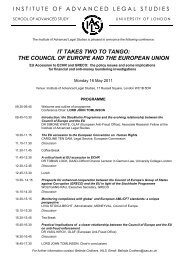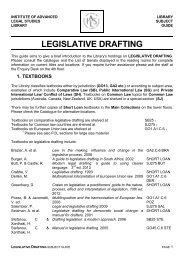a thesis - Institute of Advanced Legal Studies
a thesis - Institute of Advanced Legal Studies
a thesis - Institute of Advanced Legal Studies
You also want an ePaper? Increase the reach of your titles
YUMPU automatically turns print PDFs into web optimized ePapers that Google loves.
78 EXPRESS TRUSTS.<br />
In such cases there is really no intention on the part <strong>of</strong> the<br />
settlor to create the particular trust in fact created; the mistake is<br />
fundamental; but apparently the trust is not void, it is only<br />
voidable; so that if the title <strong>of</strong> a bond fide purchaser for value<br />
without notice has intervened, as against him, the trust cannot be<br />
revoked. (See Pollock, Contracts, 7th ed. 596 and 605.)<br />
This is, <strong>of</strong> course, a different matter from mistake in the<br />
expression <strong>of</strong> intention. That also gives a right to relief, but it<br />
seems to belong to the sphere <strong>of</strong> contract law rather than the law<br />
<strong>of</strong> trusts. It is fully dealt with in Pollock on Contracts, 7th ed.<br />
pp. 498 et seq.; and in White & Tudor's Leading Cases in Equity,<br />
7th ed. vol. ii. 798 et scq.<br />
FRAUDULENT PURPOSE.<br />
A trust may likewise be void if the purpose for which it is<br />
created be fraudulent. There are two classes <strong>of</strong> cases in which this<br />
has acquired a special importance: (1) where the purpose is to<br />
defraud the creditors <strong>of</strong> the settlor, and (2) where it is to defraud<br />
purchasers from him.<br />
Trusts in Fraud <strong>of</strong> Creditors.—A trust may be void as against<br />
the creditors <strong>of</strong> the settlor, either under the statute 13 Eliz. c. 5,<br />
or under the Bankruptcy Act, 1883, s. 47.<br />
13 Eliz. c. 5—omitting unnecessary verbiage—is an act for<br />
"avoiding gifts, grants and conveyances, as well <strong>of</strong> lands and tenements<br />
as <strong>of</strong> goods and chattels devised to the intent to delay,<br />
hinder, or defraud creditors and others," and s. 1 declares that<br />
every gift, grant and conveyance <strong>of</strong> lands, tenements, hereditaments,<br />
goods and chattels, or any <strong>of</strong> them, by writing or otherwise,<br />
to or for any intent or purpose before declared, shall be deemed<br />
(only against that person hindered, delayed or defrauded) to be<br />
void.<br />
By s. 5 the act is not to extend to any estate or interest in<br />
lands, tenements or hereditaments, goods or chattels upon good<br />
consideration and bond fide conveyed or assured to any person not<br />
having at the time any notice <strong>of</strong> such fraud.<br />
The statute speaks <strong>of</strong> fraudulent, not voluntary conveyances.<br />
Consequently, a conveyance cannot be set aside under it merely<br />
because it is voluntary; it must also be shown to be fraudulent.<br />
Conversely, the exception only being in favour <strong>of</strong> conveyances



